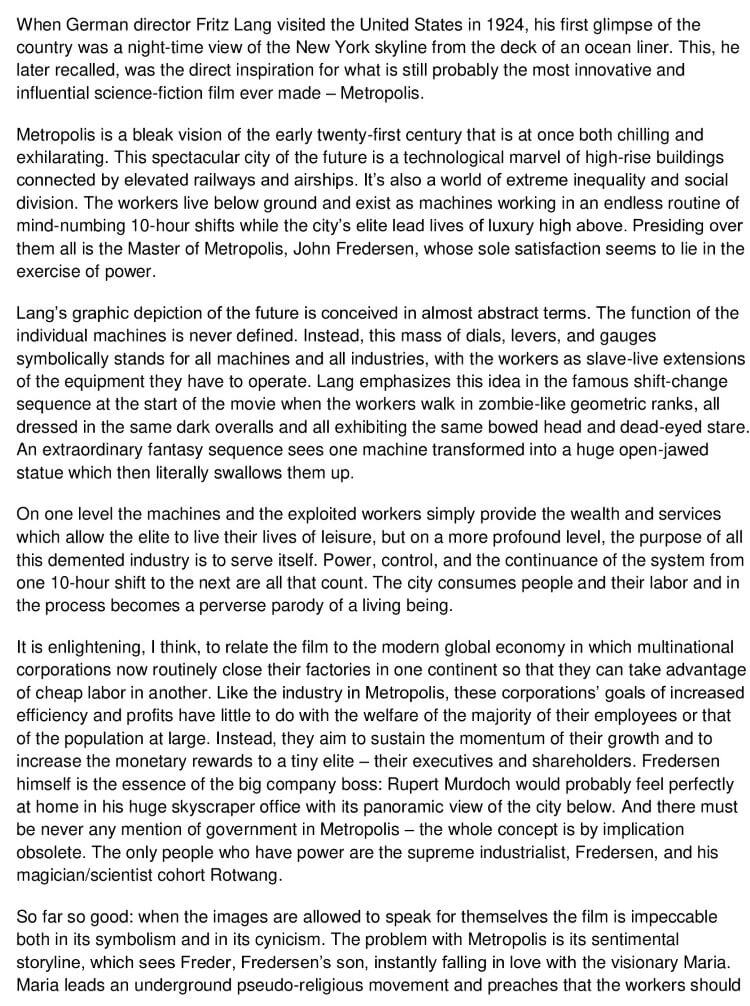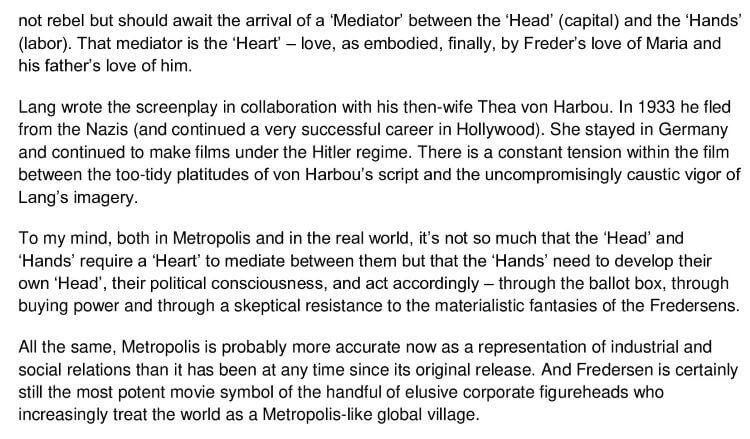Metropolis - IELTS Reading Answers
11 min read
Updated On
-
Copy link
Find accurate Metropolis IELTS Reading answers with clear explanations, keyword analysis, and proven strategies to help you understand the passage better, avoid common mistakes, and confidently boost your IELTS Reading score.
Table of Contents

Limited-Time Offer : Access a FREE 10-Day IELTS Study Plan!
The IELTS Reading passage “Metropolis” includes a range of question types and is ideally designed to be completed within 20 minutes. Practising this passage will help candidates become familiar with the difficulty level and improve time management skills. Try answering the questions below to assess your performance and strengthen your IELTS Reading preparation.
Reading Passage: Metropolis
- Yes/ No/ Not Given (Q.27 – Q.30)
- Sentence completion (Q.31 – Q.36)
- Multiple Choice Questions (Q.37 – Q. 40)
Metropolis- IELTS Reading Passage
You should spend about 20 minutes on Questions 27 - 40, which are based on the Reading Passage below.


Boost your IELTS Academic Reading score today! Grab Get Your IELTS Reading Ebook Now!
Metropolis- IELTS Reading Questions
Questions 27-30
YES if the statement is true
NO if the statement is false
NOT GIVEN if the information is not given in the passage
27 The inspiration for the movie Metropolis comes from the director’s visit to the USA in 1924.
28 The Master of Metropolis, John Fredersen, is portrayed by an industrialist that the director met in the US.
29 The start of the movie exhibits the workers working with full energy.
30 The director and his wife got divorced because his wife decided to stay in Germany.
Questions 31-36
Complete the summary below. Use NO MORE THAN TWO WORDS from the Reading Passage for each answer.Write your answers in boxes 31-36 on your answer sheet.
The director depicts a world of inequality and 31 ………………………. In the future, the mindless masses of workers living underground are treated as 32………………………. And the master of them is 33……………………….., who is in charge of the whole city. The writer claims that the director, Fritz Lang, presents the movie in a 34……………………….. term, where the 35……………………… of the individual machines is not defined. Besides, the writer compares the film to the modern global economy in which multinational corporations concern more about the growing 36………………………….. and money.
Questions 37-40
37 The first sentence in paragraph B indicates
A. the author’s fear of technology
B. the inspiration of the director
C. the contradictory feelings toward future
D. the city elite’s well management of the workers
38 Why the function of the individual machines is not defined?
A. Because Lang symbolically sticks to the theme.
B. Because workers are more important to exploit.
C. Because the fantasy sequence is difficult to take.
D. Because the focus of the movie is not about machines.
39 The writer’s purpose in paragraph five is to
A. emphasize the multinational corporations’ profit-oriented goal.
B. compare the movie with the reality in the modern global economy
C. exploit the difference between fantasy and reality
D. enlighten the undeveloped industry
40 What is the writer’s opinion about the movie?
A. The movie’s storyline is excellent.
B. The movie has a poor implication in symbolism.
C. The movie is perfect in all aspects.
D. The movie is good but could be better.
Metropolis- IELTS Reading Answers
Let’s now review the answers to the questions from the passage in the reading section, Metropolis- IELTS Reading Answers, and assess your improvement for a high IELTS Reading band score.
27 Answer: Yes
Question type: Yes/No/Not given
Answer location: Paragraph A full
Answer explanation: “When German director Fritz Lang visited the United States in 1924, his first glimpse of the country was a night-time view of the New York skyline from the deck of an ocean liner. This, he later recalled, was the direct inspiration for what is still probably the most innovative and influential science-fiction film ever made – Metropolis.” These lines make it apparent that the inspiration behind the movie ‘Metropolis’ is the director’s visit to the USA in 1924 to the New York Skyline, USA.
28 Answer: Not given
Question type: Yes/No/Not given
Answer location: N/A
Answer explanation: There is no such reference made in the passage where the inspiration behind the character of Fredersen is any real-life person whom the writer would have met.
29 Answer: No
Question type: Yes/No/Not given
Answer location: Paragraph B, lines 2-6
Answer explanation: “This spectacular city of the future is a technological marvel of high-rise buildings connected by elevated railways and airships. It’s also a world of extreme inequality and social division. The workers live below ground and exist as machines working in an endless routine of mind-numbing 10-hour shifts while the city’s elite lead lives of luxury high above.” Hence it is quite evident that the workers were not working enthusiastically or with exuberance, they were rather working like machines and were made to work over the human capacities. These lines set the disparity between the rich and the poor of the Metropolis.
30 Answer: Not given
Question type: Yes/No/Not given
Answer location: N/A
Answer explanation: There is no such reference found in the paragraph where the reason behind the separation/divorce between the director and his wife is highlighted. Although the director’s wife’s wish to stay back in Germany is mentioned, it is not necessarily the reason behind their divorce.
31 Answer: Social divisions
Question type: Summary completion
Answer location: Paragraph B, lines 3-4
Answer explanation: “It’s also a world of extreme inequality and social division.” Hence the answer should be social division as is pretty clear from this line where the director depicts the situation in Metropolis to be harsh, unjust, and with inequality and social division.
32 Answer: Machines
Question type: Summary completion
Answer location: Paragraph B, lines 4-5
Answer explanation: “The workers live below ground and exist as machines working in an endless routine of mind-numbing 10-hour shifts “ This suggests that the workers were working as machines with an exceedingly higher number of hours.
33 Answer: John Frederson
Question type: Summary completion
Answer location: Paragraph, lines 6-7
Answer explanation: “Presiding over them all is the Master of Metropolis, John Fredersen, whose sole satisfaction seems to lie in the exercise of power.” This suggests that John Frederson was the master of Metropolis who used to feel great to exercise his powers and supremacy.
34 Answer: Abstract
Question type: Summary completion
Answer location: Paragraph C, lines 1-2
Answer explanation: “Lang’s graphic depiction of the future is conceived in almost abstract terms.” This suggests that the director Lang makes the depiction quite abstract and vague.
35 Answer: Function
Question type: Summary completion
Answer location: Paragraph C, line 2
Answer explanation: “The function of the individual machines is never defined.” It suggests that the functions of the laborers are not disclosed. There is a denotation of laborers as machines, however, the function/work they have to do is not specified.
36 Answer: Efficiency
Question type: Summary completion
Answer location: Paragraph E, lines 3-7
Answer explanation: “Like the industry in Metropolis, these corporations’ goals of increased efficiency and profits have little to do with the welfare of the majority of their employees or that of the population at large. Instead, they aim to sustain the momentum of their growth and to increase the monetary rewards to a tiny elite – their executives and shareholders.” These lines imply that bearing a similitude with the real-life situations, the movie highlights how the rich and successful MNCs are least bothered by the common public. All they care for is their budding economy and efficient growth. Hence, the answer should be efficiency as ‘economy’ is already mentioned in the question.
37 Answer: C
Question type: Multiple Choice Question
Answer location: Paragraph B, lines 1-4
Answer explanation: “Metropolis is a bleak vision of the early twenty-first century that is at once both chilling and exhilarating. This spectacular city of the future is a technological marvel of high-rise buildings connected by elevated railways and airships. It’s also a world of extreme inequality and social division.” These lines bring about the line of contrast between the situations in Metropolis. While on one hand, it is considered to be exuberant and ecstatic, poverty, inequality, and social difference are also highlighted.
38 Answer: A
Question type: Multiple Choice Question
Answer location: Paragraph C, lines 1-4
Answer explanation: “Lang’s graphic depiction of the future is conceived in almost abstract terms. The function of the individual machines is never defined. Instead, this mass of dials, levers, and gauges symbolically stands for all machines and all industry, with the workers as slave-live extensions of the equipment they have to operate.” This indicates the reason behind not mentioning the function of the machines, which is a denotation of laborers. The lines imply that since the director uses a symbolic way of narration, he didn’t mention the work/function the machines have.
39 Answer: B
Question type: Multiple Choice Question
Answer location: Paragraph E, lines 1-7
Answer explanation: “It is enlightening, I think, to relate the film to the modern global economy in which multinational corporations now routinely close their factories in one continent so that they can take advantage of cheap labor in another. Like the industry in Metropolis, these corporations’ goals of increased efficiency and profits have little to do with the welfare of the majority of their employees or that of the population at large. Instead, they aim to sustain the momentum of their growth and to increase the monetary rewards to a tiny elite – their executives and shareholders.” By these lines, we can easily sense the intent of the writer. He wants to draw attention to real-life situations, such as poverty, inequality, greed, and exploitation by the rich which is symbolized in the movie. Hence this is a clear comparison between the movie and the modern economy.
40 Answer: D
Question type: Multiple Choice Question
Answer location: Paragraph F, lines 1-6
Answer explanation: “So far so good: when the images are allowed to speak for themselves the film is impeccable both in its symbolism and in its cynicism. The problem with Metropolis is its sentimental storyline, which sees Freder, Fredersen’s son, instantly falling in love with the visionary Maria. Maria leads an underground pseudo-religious movement and preaches that the workers should not rebel but should await the arrival of a ‘Mediator’ between the ‘Head’ (capital) and the ‘Hands’ (labor).” This indicates the perception of the writer as far as the movie is concerned. He considers it to be a fine movie with some areas that he feels could have been improved, such as sentimental scenes.
Tips to Ace Metropolis- IELTS Reading Answers
Let us check out some quick IELTS Exam Preparation Tips for Band Score of 8+ to answer the types of questions in the Reading Answers.
Yes / No / Not Given
- Focus on the author’s opinion, not just facts. “Yes” = agrees, “No” = disagrees, “Not Given” = no clear view.
- Underline keywords in the statement and locate them in the passage.
- Look for paraphrasing—the wording in the passage is rarely identical.
- Pay attention to qualifiers like always, only, never, which affect the answer.
- Do not assume information—if the answer isn’t clearly stated, choose Not Given.
Sentence Completion
- Read the question carefully to understand the context before scanning the passage.
- Predict the missing word in your own words before checking the passage.
- Check grammar and word form—the completed sentence must be grammatically correct.
- Scan for keywords and synonyms in the passage that match the sentence context.
- Watch word limits; follow the instructions for maximum words allowed.
Multiple Choice Questions
- Read all options carefully before choosing; don’t jump to the first plausible answer.
- Look for specific details in the passage that support one option.
- Eliminate options that are clearly incorrect to narrow down your choice.
- Watch for paraphrasing—the answer may be reworded in the passage.
- Focus on meaning, not just keywords—sometimes options are true but not relevant.
Want to boost your IELTS score? Enroll in our expert-led IELTS online classes today!
In conclusion, the IELTS Reading passage "Metropolis- IELTS Reading Answers” allows candidates to practise a range of question types while improving comprehension and information-identifying skills. With complete answers, keyword locations, and explanations, this article helps learners understand the passage more effectively, enhance accuracy, and boost their overall IELTS Reading score. Keep practising with more IELTS Reading Recent Actual Tests and answers on IELTSMaterial.com to improve your speed, accuracy, and overall performance.
Check More IELTS Reading Answers
Practice IELTS Reading based on question types

Start Preparing for IELTS: Get Your 10-Day Study Plan Today!
Recent Articles

Nehasri Ravishenbagam

Haniya Yashfeen

Haniya Yashfeen

Haniya Yashfeen




Post your Comments